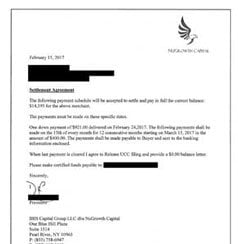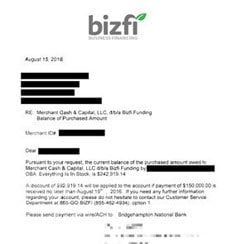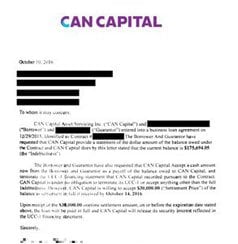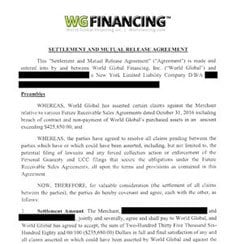Small Business Debt Relief
Negotiate, restructure, consolidate, and manage business cash advance loans
United Settlement helps small businesses that are struggling with their payments. This includes business cash advance loans, which have interest rates of 100% or more.
We help by negotiating settlements and restructurings of these loans according to our core process. Our small business debt relief program is designed to help small businesses stay afloat and grow.
Related to: Small business debt relief
Table Of Contents
- Merchant and Business Cash Advance Loan
- Business / Merchant Cash Advance Calculator
- Small Business Debt Consolidation
- Small Business Debt Management
- United Settlement Small Business Debt Relief
- United Settlement Business Debt Relief History
- Experienced Team
- Reduce Payments and Avoid Bankruptcy
- Results Right Away
- Small Business Debt Relief Results
- Recent Business Cash Advance Results
Merchant and Business Cash Advance Loan
Cash advances from merchants or businesses are loans or purchases of future sales. This type of financing can be quick, but it can be expensive. The financing is often paid back daily, and the payments can cause cash flow problems for a business. In some cases, this has even forced businesses to file for bankruptcy.
Business / Merchant Cash Advance Calculator
The business / merchant cash advance calculator lets you calculate the daily payment difference between your business cash advance loan and our program. On average, our clients are saving 50 percent, increasing working cash flow drastically. Use this tool to also see what annual interest rate (APR) you are actually being charged.
We negotiate business loans for you, giving you time to run your business. Small businesses save on average 50% of the total balance with this business debt relief program. This is a cutting edge business debt relief program done by experts.
Merchant Cash Advance Calculator
=$
=1.4
= $14,000
=
= 80%
= $583.33
United Settlement Calculator
=$
=$5,000
=$6,750
=
=$3,250
=$312.50
Small Business Debt Consolidation
Small business debt consolidation combines multiple loans or merchant cash advances into one loan, which could result in lower payments. Small business debt consolidation is a great option for businesses who are struggling with payback, but want to maintain good relationships with creditors.
Small Business Debt Management
Business debt management begins with understanding the financial situation and goals. We develop a unique budget for your business that helps you succeed. We build a specific action plan for your business and present it to your creditors on your behalf.
To use the business and merchant cash advance calculator, in the “Current Advance” field, enter your cash advance amount. In the “Term” field enter how many months your loan is. Repeat these steps using the United Settlement Calculator to compare daily payments, interest rate, and amount you can save.
United Settlement Small Business Debt Relief
United Settlement Business Debt Relief History
Experienced Team
Reduce Payments and Avoid Bankruptcy
The small business debt relief program reduces your payments by 50% and provide better alternatives to bankruptcy. See how you can keep your business afloat without going bankrupt. You can choose weekly, bi-weekly, or monthly payments.
Results Right Away
Our business debt relief program makes you to see and feel results right away. From the 1st business day enrolled your payments will be reduced by approximately 50%. Your business will have operating cash flow and we will be in communication with your creditors. You will no longer have to deal with collection calls that take time away from you. We speak to them and negotiate on your behalf based on your business situation and business debt relief program.
Small Business Debt Relief Results
We take the most pride not in the millions of dollars saved for our small businesses clients, but in the hundreds of business saved from our small business debt relief solution. We take an aggressive approach to negotiate your debt as soon as possible. Our debt experts work on every client daily. Our team works with the largest business / merchant cash advance companies such as: OnDeck, CAN Capital, QuarterSpot, BizFi, Kabbage, Everest, LoanMe, American Express, PayPal, Square, and more. Our business debt relief results speak for themselves, although we cannot act for you. Contact us now to keep your business afloat without going bankrupt with our business debt relief program. This is a cutting-edge debt relief program done by experts.
Recent Business Cash Advance Results
Here is a small sampling of the successful business debt settlements we’ve made for our clients. You’ll find debt settlement letters from many business / merchant cash advance companies. We update this page regularly, if you do not see your business merchant cash advance financing company that doesn’t mean we don’t work with them. If you are seeking results from a specific financing company / bank contact us and we will provide you with a settlement letter.

Total Debt
$36,072.33
Paid $14,195

Total Debt
$242,919.14
Paid $150,000

Total Debt
$175,694.05
Paid $30,000

Total Debt
$235,680.00
Paid $180,000
Small Business Debt Relief FAQ
There are two general categories of business loans – secured and unsecured. In the case of secured business loans, a small business borrower will post a specific piece of collateral in the form of a valuable asset – including real estate, inventory, or manufacturing equipment – that a lender can potentially seize (and sell) in the event of non-repayment. With unsecured business loans, borrowers do not put up collateral, but in order to mitigate the risk associated with them, lenders attach higher interest rates to unsecured business loans.
Revolving debt consists of open-ended accounts, usually with variable interest rates and established credit limits that require monthly payments as a percentage of the outstanding balance. Though such a credit line provides access to capital, the funds take the form of a liability that actually deducts from working capital, which is defined as current assets minus current liabilities.
The typical interest rate for a small business borrower will depend upon a variety of factors including the borrower’s qualifications, the type of loan, and the lender. Small business loans from traditional lenders, such as banks and credit unions, can come with interest rates as low as 4% in the best cases, ranging up toward 13%. For non-traditional online lenders, the best small business loan interest rate will be closer to 7%.
Penalty APR is typically applied for six months and often is significantly higher than the previous interest rate. Avoiding Penalty APR is yet another reason to consistently pay credit card bills in a timely manner.
There are a few ways to start a business debt free. One way is to bootstrap your business, meaning you use your own money to get started. Another way is to find a partner who can invest in your business and share the financial responsibility. Finally, you can look for funding from grants or loans from banks or other institutions. Whichever route you choose, make sure you have a solid business plan in place to help you stay on track financially.
There is no simple answer to this question as it depends on the specific situation. In general, however, business debt may affect personal debt in a few ways. For example, if a business is not doing well and is unable to pay its debts, this may have a negative effect on the personal finances of the owners or shareholders. Additionally, if a person has guaranteed a loan for a business or is personally liable for business debts, this may also negatively impact their personal finances. Finally, certain business structures, such as LLCs, offer protection from personal liability for business debts, which can help shield individual owners from potential personal financial repercussions.
Get Debt Relief
Speak with licensed debt specialists dedicated to guiding you toward financial stability every step of the way.

Ready To Get Started?
See if you qualify for debt relief. Get a Free savings estimate to see how quickly you can be debt free.
Embrace financial freedom with our tailored solutions, expert guidance, and unwavering commitment to your success.
Experienced Professionals
Our experienced team has helped thousands of clients successfully eliminate debt and regain financial freedom.
Customized Solutions
We know every financial situation is different, so we design personalized debt relief plans to fit your specific needs and goals.
High Success Rate
Our proven debt relief strategies deliver real results. With a strong track record of success, we help clients achieve lasting financial stability.
Confidential Consultation
Your privacy is our priority. All debt relief consultations are 100% confidential and handled with the highest level of discretion.